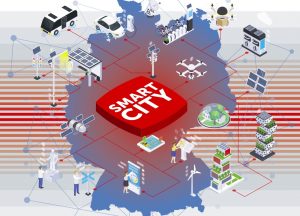· Digital applications in the Smart City save resources, increase efficiency and thus make a significant contribution to climate protection
· Improved traffic flows save up to 50 per cent of CO2 emissions in urban car traffic by 2030
· Gigabit networks can potentially save around 270,000 tons of CO2 in data transport
Digital technologies and services enable high CO2 savings in cities and metropolitan areas. In this way, they make a significant contribution to climate protection and are indispensable on the way to a carbon-neutral city. This is shown by the study “The Smart City Market in Germany, 2021-2026”, which was prepared by eco and Arthur D. Little with the support of the Vodafone Institute for Society and Communication and the companies Uber, Netcologne and Cloudflare. The study identifies the CO2 savings potential in nine segments, describes sustainability innovations and corresponding business models.
Digital technologies and applications make an indispensable contribution to achieving the German climate target of 55 per cent CO2 reduction by 2030, shows the study “The Smart City Market in Germany, 2021-2026”. The sustainable trend in the Smart City also promotes growth in numerous industries with new business models and investments.
In 2020, during the various Covid-related lockdowns worldwide, the potential of digital technologies and applications to reduce CO2 emissions came to the fore. By 2026, the study authors expect major sustainable effects in the Internet industry, building automation, transport & logistics (mobility), energy supply, healthcare and retail & hospitality segments. The introduction of gigabit-capable infrastructures, for example, can lead to a reduction of CO2 emissions by 270,000 tonnes in data transport. Smart buildings save 275 million tonnes of CO2 by 2026. Sharing concepts and the improvement of traffic flows, among other things through smart parking, can reduce CO2 emissions in urban car traffic by up to 50 per cent by 2030. Citizens will save up to 34 billion Euros in costs for finding parking spaces alone. Car-sharing services will have a direct sustainability effect of around 0.52 million tonnes of CO2 by 2026.
Intelligent use of digital technologies saves CO2
“Cities are the places where the majority of humanity lives in the 21st century. Therefore, they must be pioneers for a green transformation of the economy and society and real laboratories for carbon neutrality,” says Inger Paus from the Vodafone Institute. The Smart City study shows that this will only work with the intelligent use of digital technologies. “If we succeed in raising the potential of digitalisation in cities worldwide, this will not only lead to a better quality of life, but also make a significant contribution to climate and environmental protection,” Paus continues.
Oliver Süme, Chair of the Board at eco – Association of the Internet Industry calls on cities to create the framework conditions for sustainable digital services. “Cities need to think across segments, a holistic application of Smart City concepts is the key to sustainable digitalisation.” For him, this includes the promotion of energy-efficient data centres and the increased utilisation of waste heat, as well as the introduction of low-resource communication services. “For example, incentives are needed for the use of heat pumps to process waste heat for municipal local and district heating networks. At the same time, professional protection of the ecosystem through investments in cybersecurity is recommended,” Süme continues.
Synergies from networking the sustainable Smart City
Study author Lars Riegel, partner at Arthur D. Little, gives an example of the sustainability effects of networked thinking: “Many cities and municipalities are replacing their street lighting with modern LED technologies that consume up to 70 per cent less electricity. However, the major sustainability effect only becomes apparent when the street lights are intelligently connected, equipped with sensors and additionally use the resulting infrastructure for smart parking systems. In this case, the burning time is reduced by another 50 per cent,” says Riegel. “Comprehensively designed Smart City platforms leverage holistic sustainability potentials thanks to synergies between segments. This creates ecosystems as drivers for additional sustainable progress.”
The study “The Smart City Market in Germany, 2021-2026”, presented in June 2021, forecasts average annual growth of over 17 per cent. This corresponds to an increase in sales of over 46 billion Euro within five years. The study outlines trends and challenges in detail for a total of nine segments of the German Smart City market. The authors expect particularly high turnover in the market segments of Digital Education (16.6 billion), Transport & Logistics (14.8 billion) and Building Automation (14.1 billion).
The new study “The Smart City Market in Germany, 2021-2026” is available for download here.




